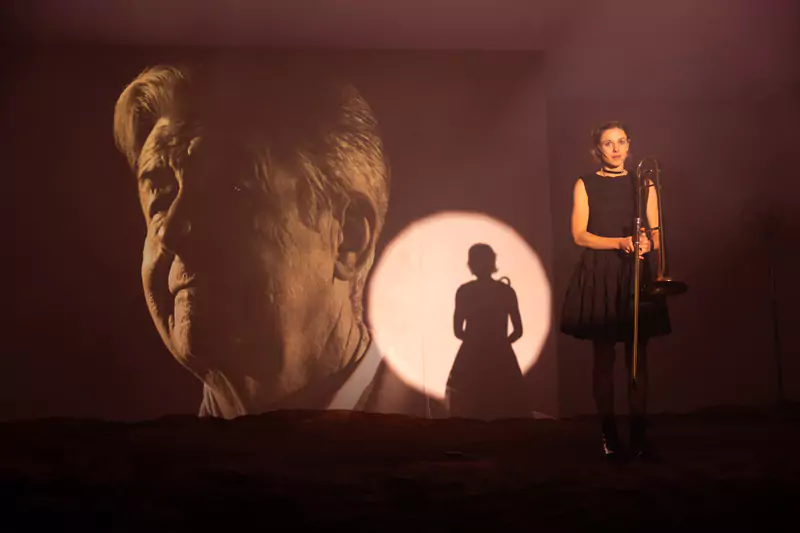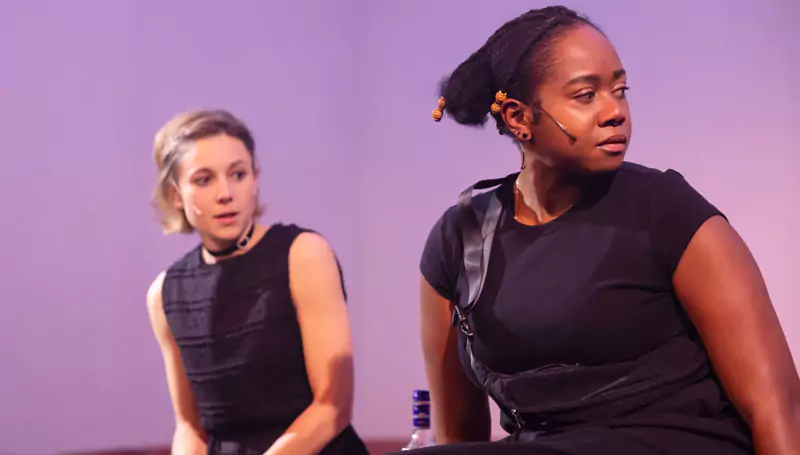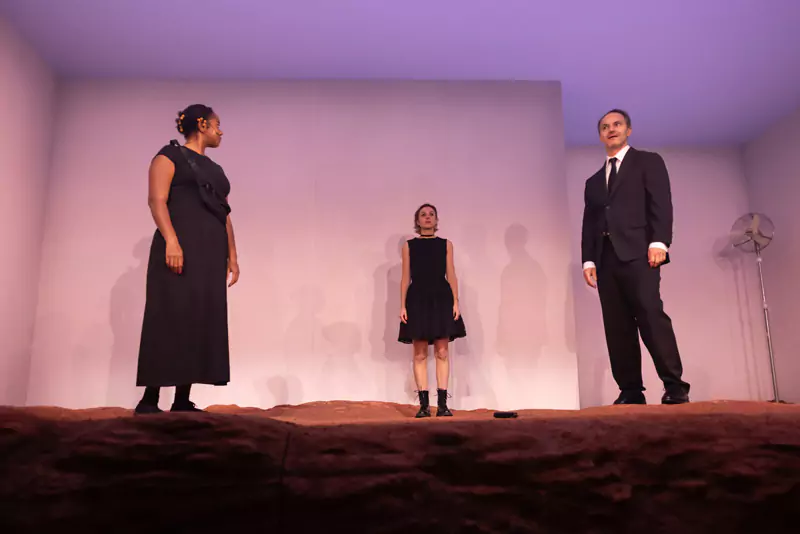“Stolen Ground” at Théâtre des Capucins
Dana Rufolo in Luxembourg
October 9, 2024
It is always a sign that theatre is well integrated into the cultural spectrum of a country when emerging local playwrights have their work performed with loving care, with all the resources of the professional theatre available to them. Commercial pressure on theatres means too often that new playwrights find their work relegated to outlying amateur and experimental stages (when these alternatives exist).

Dorothée Neff as Girl and projection of grandfather.
Photo credit: Bohumil Kostohryz.
Anna Leader, a British-American author and playwright who grew up in Luxembourg had her play Stolen Ground produced in Luxembourg as a TalentLAB project under ideal conditions: at one of the two main théâtres de la ville de Luxembourg, Théâtre des Capucins, and directed by the British director Richard Twyman, artistic director of the English Touring Theatre. Twyman mentored Leader, for whom Stolen Ground is the first full-length drama, bringing her through several drafts of the script accompanied by the entire production team (which includes a movement director, a dramaturg, a composer, a video designer and a lighting designer) and who sat together to discuss the project’s development for over a year.
Stolen Ground is a play of ideas expressed in a compelling fashion, with two girls, Girl (Dorothée Neff) and Friend (Shayde Sinclair) absolutely best friends who are possibly even attracted to one another in a hesitant first-love kind of way getting to know each other better and discovering differences they had overlooked. The girls are roommates at a posh British boarding school who meet outside their habitual school environment for the first time. They meet at the farmhouse of Girl’s grandfather somewhere – Africa or the Caribbean, presumably – where slavery had been practiced not too long in the past. Unexpectedly, he has just died.
Twyman chose a set (designed by Anouk Schiltz) representing the ancestral home of bare walls that serve as a backdrop onto which can be projected the looming face of this grandfather (Marco Lorenzini) whose adamant colonialist activities negatively affect the drama unfolding on stage. The stage floor is ground that looks like compacted earth, representing the farm this grandfather exploited; we are led to believe he did this by means of slave labour and a propensity for violence towards the indigenous population.
Shayde Sinclair, Dorothée Neff and Philipp Alfons Heitmann.
Photo credit: Bohumil Kostohryz.
And there’s the rub. Girl is privileged and white whereas Friend is a scholarship girl whose family comes from the very town where the grandfather’s farm is located and where she is staying with Girl and Girl’s dad. Suddenly, the racial and economic differences between them menace their idyllic friendship based on being roommates.
Why did Girl fall for a person who is a descendant of the same people that her grandfather exploited and, even, it turns out, murdered? Why does Friend, who needs money to pay the small amount of tuition not covered by her scholarship, befriend a person who is so financially well-off that she could easily decide to offer that money as a gift? The unconscious motivations that may have been behind the two girls seeking each other out as best friends pop into mind, and neither feels comfortable any longer with their attempts to profit from the friendship. Under the burden of hidden motivations, both girls realize that pretending to not notice each other’s racial origins was a fatal flaw. The time to split up has arrived, and that is the crux of the drama.
We see the grandfather, his face is always projected on stage. Another character is never seen but often reported on; that is Girl’s mother, an artist and woman of principle who refuses to fly in and join them despite her father-in-law’s funeral (and also despite it being Christmas time.) A third unseen character who also casts her presence is an indigenous woman who meets Friend at the funeral and says she should be ashamed of having anything to do with Girl’s family. Even though the play is a three-hander, these absent characters walk like ghosts among the living, somewhat maliciously confusing them about who they are and how they might be able to identify themselves teleologically so as to free themselves from the shackles of the past in order to engage actively with the future that lies before them.
Each actor plays her or his role well; they are believable, especially the two friends. Nonetheless, they don’t quite flesh out their characters. If investigated fully, Friend’s role would have required someone prouder, in a puffed-up chest kind of way. She mentions her academic achievement to Girl with modest self-deprecation, whereas in fact her achievements are exactly what the meritocracy she lives in requires so as to facilitate her advancement out of the pit of prejudice and self-declared defeat.
Girl ought to have been more out of body – extremely confused about her own identity as a white girl. And most importantly, Dad (Philipp Alfons Heitmann) would have found his equilibrium, whereas now he is something of an intentional clown figure, destabilized by horizontal as well as vertical family secrets that the actor should have known about even if the character does not.
And this absence of emotional exhibitionism is ultimately a characteristic of Luxembourg in both a positive and a negative way.
Leader grew up in the wealthiest country in the world which, although it has been invaded multiple times, has no history of instigating military invasions and is presently rampantly multicultural. It is a place where ideas can be discussed intellectually without recourse to an emotional gut response. I for instance could never have discussed a racial issue with austerity, because my grandparents were subjected to anti-Italo-American racism that affected my parents and therefore me. Anger flickers just beneath the surface.
But Leader’s Girl is placid as a lake when she makes absurd economic promises or pretends that her friend’s racial origin is immaterial, and Friend is equally placid as she cleverly chooses what part of her past to embrace and what part to reject. So calm and such self possession! Only in a country like Luxembourg, remote emotionally from the #blacklivesmatter movement, could Stolen Ground have flowered into existence and be seen by an understanding public. In this respect, it is one of the first truly “Luxembourgish” dramas.










